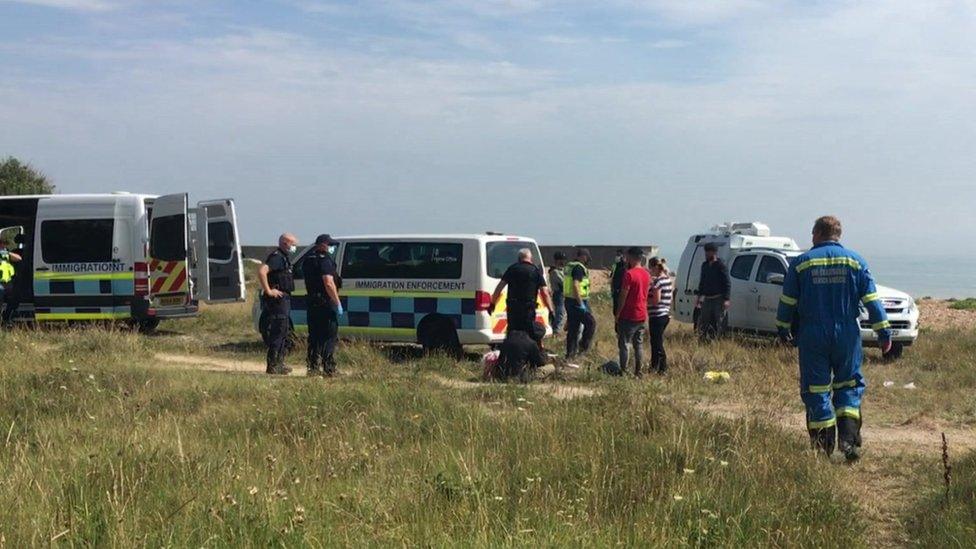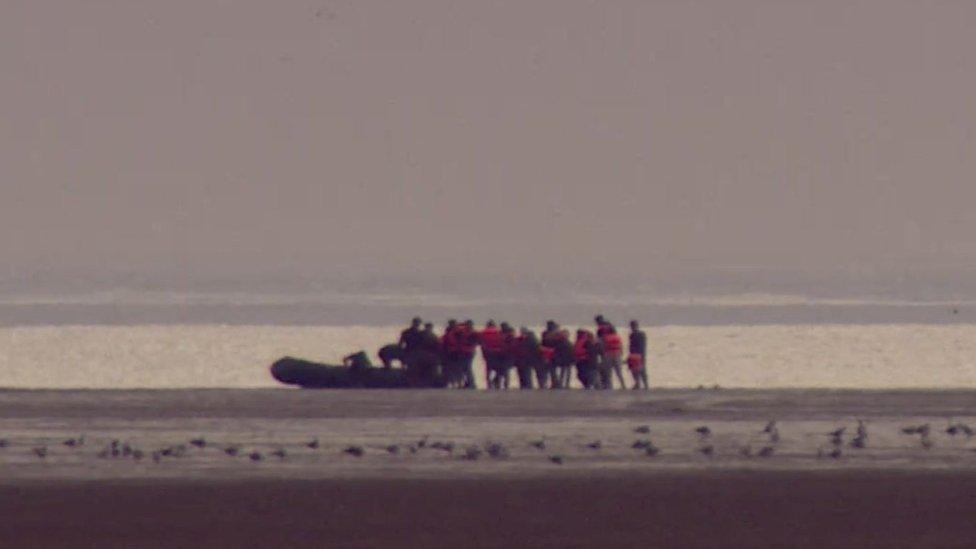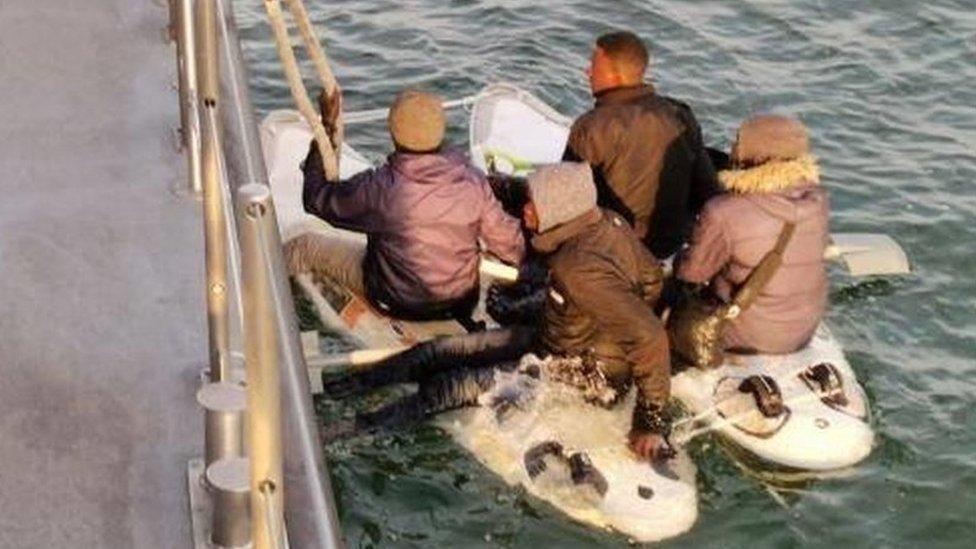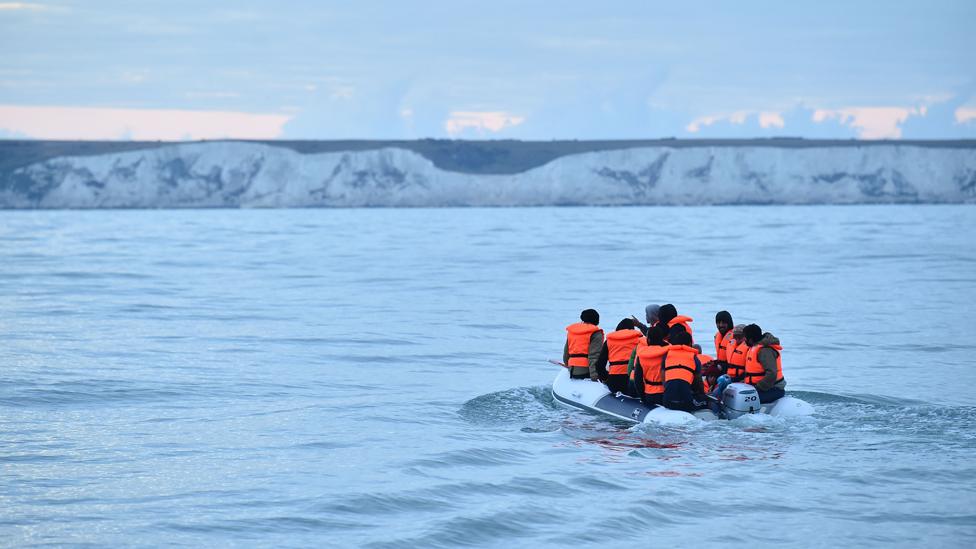Home Office seeks military help over migrant crossings
- Published
Migrants setting out to sea 20 miles east of Calais were filmed by a BBC team, as Gavin Lee reports
Defence chiefs are considering a request from the Home Office for help to deal with migrants attempting to cross the English Channel.
The government is looking at using boats to "prevent people from leaving", Schools Ministers Nick Gibb said.
It comes as more migrants were brought ashore on Saturday.
Meanwhile, the home secretary has appointed a former National Crime Agency executive to a new role leading the UK's response to the crossings.
More than 500 people have been intercepted crossing the English Channel in recent days, including 235 - the record for a single day - on Thursday.
The Home Office said at least 151 people arrived in UK on Saturday in 15 boats. A total of 146 people arrived on Friday on 17 boats.
The Ministry of Defence (MoD) said it was "working hard" to identify how best to assist, after receiving a request under the military aid to the civilian authorities (MACA) protocol.
Two boats carrying a total of 26 migrants arrived on the Kent coast on Saturday, and it is understood there were also landings at Deal and Folkestone - although they have not been confirmed.
A person in a wheelchair was among those brought ashore in Dover.
French officials said 33 migrants in two boats that got into difficulty have been returned to Calais.
Home Secretary Priti Patel has appointed Dan O'Mahoney as the UK's Clandestine Channel Threat Commander. He will work to make the Channel route "unviable" for small boat crossings.
The Home Office said Mr O'Mahoney, director of the Joint Maritime Security Centre since 2019 and a former Royal Marine, will seek "tougher action in France, including stronger enforcement measures and adopting interceptions at sea and the direct return of boats".
Earlier, Ms Patel said in a tweet, external that ministers were working to make the "dangerous" Channel crossing route "unviable", but added that the government faces "legislative, legal and operational barriers".

Migrants and Border Force officers in Kingsdown, on the English Channel coast of Kent
On Saturday morning, the BBC filmed a rubber boat with up to 20 people on board - including a baby, the BBC was told - departing from a tourist beach in the north of France.
The "overloaded" boat struggled for almost an hour at the water's edge, according to BBC Europe reporter Gavin Lee, who said there was no sign of any surveillance from French authorities on the beach near the harbour of Gravelines.
BBC reporter Simon Jones said people living in Kent have been asking why more is not being done by the French to patrol the coastline, but French authorities have said they need more money from the UK government.
Questions have been raised about why people are not sent back to France once they arrive in the UK.
Ministers said they will press French authorities to crack down on migrants attempting to cross the Channel.
The government is also considering using boats to prevent migrants from making the crossing, Mr Gibb told BBC Breakfast.
A similar approach is already in place in Australia, where it is used against migrants travelling from Indonesia.
Under this "push back" policy, military vessels patrol Australian waters and intercept migrant boats, towing them back to Indonesia or sending asylum seekers back in inflatable dinghies or lifeboats.


The MoD generally only deploys within the UK if the civilian authorities cannot cope with a crisis, or need specialist military skills.
Examples include bomb disposal experts defusing huge World War Two bombs and the Army carrying out coronavirus testing at the height of the lockdown.
So given there is no suggestion the UK Border Force is buckling under the strain, military planners will want to know exactly what they are expected to do that can't be better solved through talks with Paris.
There has been talk of potentially using the Royal Navy to copy Australia's controversial policy of physically pushing back migrant boats.
But there are no international waters in the Straits of Dover to push them back into - so such an operation would need British vessels to enter French seas - and our neighbour's formal permission to do so.
Not only that, it would risk a drowning incident - a complete reversal of the current policy and legal obligations to pluck people from the sea.

'Political failings'
On Saturday the MoD said it would "do all it can" to support the government.
But an unnamed MoD source also told the PA news agency that the idea of using the Navy was "completely potty", and that military resources should not be used to address "political failings".
Former Labour home secretary Jack Straw said any attempt to model Australia's controversial "push back" tactics would not work and could lead to boats capsizing.
"The crucial point here is the obvious one, is that it requires the co-operation of the French," Mr Straw said.
Meanwhile, Bella Sankey, director of the Detention Action human rights campaign, condemned the idea of boats being forced back into French waters as "an unhinged proposal" that would be met with legal challenges.
BBC Breakfast's Simon Jones at sea with migrants crossing the Channel
Writing in the Daily Telegraph, external, Immigration Minister Chris Philp said migrants should be fingerprinted. However, it is unclear what the proposal will amount to, as the fingerprints of asylum seekers are already stored under the European Union Eurodac system.
Mr Philp said migrants would know "they face real consequences if they try to cross again", and added he would "negotiate hard" with French officials about how to deal with the crossings.
Former director general of UK Border Force, Tony Smith, said smugglers have identified a "loophole" in international law.
The UN's 1951 Refugee Convention says that once a person is in the jurisdiction of a country - such as territorial waters - then authorities are obliged to rescue people, bring them ashore, and allow them to lodge an asylum application, Mr Smith told BBC Radio 4's Today programme.
However, under a long-standing EU deal, called "Dublin III", the UK has the right to send back anyone who is seeking asylum if they could have reasonably claimed it in another country along the way.
That arrangement will cease at the end of the Brexit transition period - next January - unless the UK and the EU agree a similar deal.

Migrants spotted setting off from France

Our team arrived just before first light to the main tourist beach of Petit Fort Philippe near Gravelines this morning, 20 miles east of Calais.
Within minutes, we spotted more than 20 migrants carrying a rubber boat and its motor in the distance.
They were holding it above their heads as they walked for 15 minutes from the dunes, past the beach huts to the sea.
Children were at the back, holding hands and wearing life jackets. When they first got into the water, they were clearly in trouble.
The boat was overloaded with 21 people on board, letting in water and came back to shore.

Several men, who appeared to be smugglers, appeared from the dunes to the shore and took a woman and her child off the boat. They then relaunched.
It looked dangerously close to sinking and still overcrowded despite the calm waters.
In total, it took almost an hour before the boat left. In this time, there was no sign of any surveillance. We called the police to alert them, worried that the boat may be in imminent danger.
They told us they were on the way. Four hours later, there is still no sign of them.
Several bird spotters on the beach had witnessed the same thing. One told us that this is the third time this week that boats have left from here, and that each time, he could hear children crying before they got into the boat.

More than 1,000 migrants arrived on UK shores using small boats in July.
MPs have launched an inquiry into the rising numbers entering the UK, while Labour has accused ministers of "failing to get to grips with the crisis".
French police have told the BBC they intercepted 10 times the number of migrants from boats in French waters in July this year, compared to the same period last year.
They said their success rate in catching migrants has increased from 40% in 2019 to 47% in 2020.
- Published16 July 2020

- Published10 June 2020

